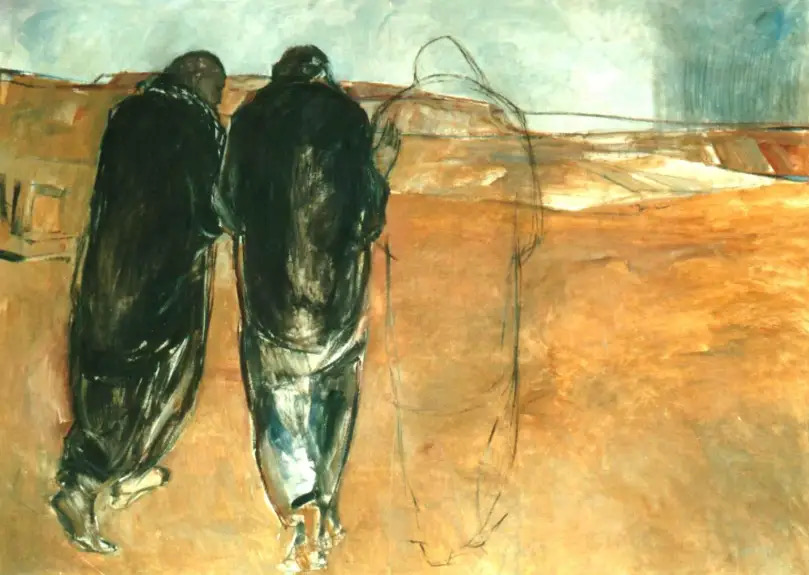“Reason speaks in words alone, but love has a song.”
I have lifted this motto from Josef Pieper, who took it from Joseph de Maistre, and who (songfully) reminds us that there are forms of Reason that bypass reason, and yet are perfectly reasonable and comprehensible.
The reasoning of poetry is something like this, but I am shy of making the unqualified statement, because poetry is often vague and showy, and not “just so.”
De Maistre (who is among my favorite French, or Savoyard, reactionaries, absolutely untroubled by the “spirit of the enlightenment” and other hints of progress) – did not say, and did not mean, “music.” Instead, he referred to a song, which is something else.
As we know, in the Middle Ages and before, music was closer to song. This was because it was sung, exclusively, by the human voice or in chorus. The two arts began to depart in more modern time, as instruments confused the issue. A violin can do many things, but it cannot sing. It can sort of sing, but needs conscious playing.
A jackhammer, or a buzz saw, or an electric guitar, can make a noise, but not music. Indeed, the development of “rock music,” and further degeneration beyond punk, represents something different again: I would rather not give it a name.
Not only has the human voice lapsed, except as a source of unpleasant noise, but song and music have ceased to convey what was conventionally thought of as the contemplative. Music, and song, have become lost arts today, in our march to human extinction. Rather than providing a source of living joy, they are a source of pain and sadness (except where sadness was allied to beauty).
But also, as the quotation affirms, singing is distinguished from talk. It communicates, but not what is communicated by talk; for the same reason one doesn’t write a production manual in elegant verse. It is a different kind of thing, as we know instinctively. Or are quite perverse.
I got myself into trouble recently by contradicting Pope Francis’s frankly Pelagian (and characteristic) declaration that, “We can only renew ourselves by discerning God’s will in our daily lives.” Several readers insisted that “discernment” had been an “official” part of the Catholic religion from soon after its beginning; and is entirely necessary in such functions as “discerning whether one is called to be a priest or religious.”
We are not children, and I will assume that in tongues of fire, or other pronouncements, the divine is not restricted to language. By analogy to human persons, we imagine Our Lord singing, not chatting. In fact, in my Blakean imagination, He goes beyond singing, as also beyond the cliches of extrasensory perception, or magic.
In my one believed encounter with Jesus, I noticed that his phrase, “Cross this bridge with me,” was communicated entirely without words, yet entirely unambiguously.

I would go farther and guess that God doesn’t mumble. He would not have difficulty with language – though He might choose to be patiently silent.
Beyond this, I guess with less confidence. Is He loud, or has He the proverbial “still small voice”? Does He speak only through the conscience? Or through the intermediation of angels and other mysterious entities? Be assured, that I can’t answer any such question, except, perhaps, on the point of volume.
For I am not only much disturbed by viciously ugly noise in my environment, but in my realization of how recent it is. Only a couple of centuries have passed since the loudest noise anyone ever heard was the thunder. No human “tech” had any device to compete with it, regularly, or at all. Peace was normal. The fright caused, by a stroke of lightning in its contact with our world, or at the culmination of another natural disaster, filled many with a holy dread. (Is such fear now religious, holy?)
It was a form of music. The birds and grasshoppers (and whales) are equipped with voices; with joy I think, but not with articulate song. The auditor is not told anything coherent. whether useful or not. One could nevertheless listen to this music at one’s leisure, and exult in its kindly senselessness.
The human music of mood is like song, but opposite. It has less meaning than we assign to it, for this “mood music” is merely something added, which no words confirm. It is not intrinsic to the music, and the hypnosis can be added in a note jotted above the musical line. (Without words, or the memory of words, it is surprisingly easy to alter the mood of instrumental music, by altering its speed.)
On one occasion, embarrassing and memorable, I recall taking advice, nearly involuntarily, from a kindly, but angry, protective angel. I was being told sharply to end what was becoming a tryst. The angel seemed perched on my right shoulder, like a crow. It suggested the phrase, “Get out!”
I shouted it immediately, and in the aftermath, I felt I’d been (undeservedly) saved.
Now this was a communication from an angel, not God. Even so, it did not require any elaborate exercise of discernment.
As in most other matters, for which “discernment” is recommended, and possibly for any of them, the challenge is not to figure out what God wants. This we may learn from our long reading of the Bible and the Saints. Or even from a short reading – if we are candid with ourselves, or willing to check the Catechism when we are unsure.
It is why I take such a dim view of that word “discernment,” and am inclined almost to insult those who smugly overuse it. Let me acknowledge that it may have some uses. But let me insist that those uses are not only rare, but vexed. The person who calls for “discernment” is most likely trying to escape a moral imperative.
Is God fooled?
*Image: Emmaus by Jane Brooks-Gerloff, 1992 [Kornelimünster Abbey, Aachen, Germany]














